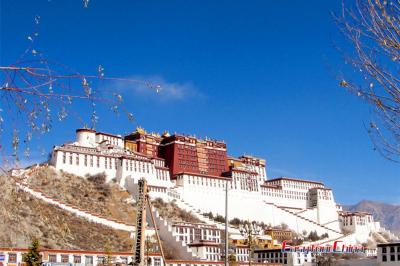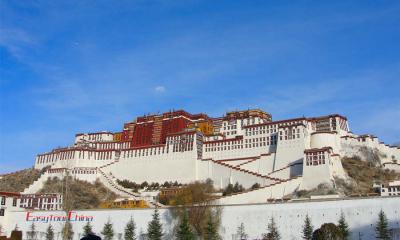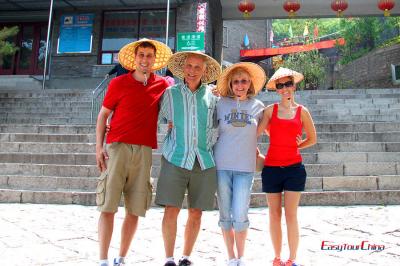Sichuan Opera
Sichuan opera or Chuanju is a type of local Chinese opera mainly prevailing in Southwestern China's Sichuan province around 1700, with a history of over 600 years. It was originated at the end of the Ming (1368-1644) and the beginning of the Qing Dynasty (1644 -1911) when immigrants flooding into Sichuan. During the period of Yongzheng and Qianlong in Qing dynasty, different dramas were brought in, such as Kunqu, Yiyang aria, Bangzi aria and Pihuang aria, blending with the local dialect, customs, folk music and dances. Thus, brisk humorous Sichuan Opera which reflects Sichuan culture was gradually came into being. By the end of Qing dynasty, Sichuan opera was played from temple fairs, halls and yard to urban theaters.
Regionally Chengdu remains to be the main home of Sichuan opera with other influential locales include Chongqing, Guizhou, Yunnan, Hubei and Taiwan. The characteristics of Sichuan Opera are unique solos, refined acting, rich percussion, and talented comedians, whose skills are unparalleled in the world. Sichuan Opera is said to have “3000 Tang stories, 800 Song tales and endless Three Kingdom anecdotes”, face changing is the highlight of Sichuan Opera, which is a must to see.
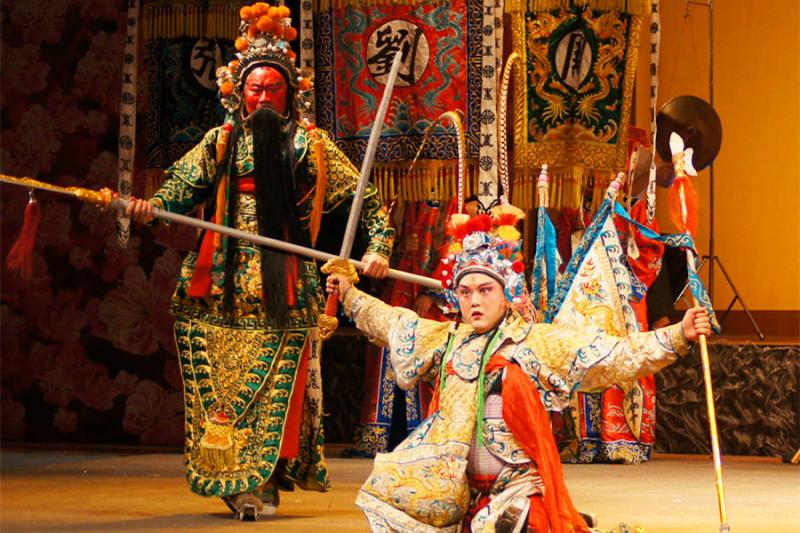
Sichuan Opera Facts
What to pay attention when seeing a Sichuan Opera Show?
Characters
The characters of Sichuan opera are divided into five professions: Xiaosheng, Danjiao, Shengjiao, Hualian, and Choujiao. Each profession has its own way of expression. Of all the characters, Xiaosheng, Danjiao and Choujiao are the most distinctive and important. There are so many performing ways, creations and techniques for these three characters, which can perfectly show the charming of Chinese operas.The character “Xiaosheng” refers to some young male characters. Usually they don’t have "beards", and play the leading male role in the play. The character “Danjiao” refers to female characters. For example, Tsing Yi Dan is mostly middle-aged or older women, wearing Tsing Yi (dark blue clothes), with the characteristics of good-heart, integrity and self-discipline. “Choujiao”, ugly character in Chinese, as the name suggests, it’s a role with an ugly appearance and it has mostly hilarious, vulgar or shallow characters.
Miracle Face changing
Face changing was inspired by ancient people who painted their faces to drive away wild animals. Thus some painted faces of Sichuan Opera are quite exaggerated. In Sichuan Opera performances, as the plot changes and the inner world of the characters changes, the facial makeup needs to change accordingly.
The skill of Face Changing used to a kind of secret at state level. In the 1960s, Premier Zhou Enlai suggested that the skill of Face Changing should be kept as a secret. It’s a way to protect folk art.
20 years later, the Ministry of Culture officially published a document that listed the art of face-changing in Sichuan opera as a second-level state secret, which is also the only state secret in the Chinese theater industry. It’s the reason why nobody is willing to reveal the core process of Face Changing in public, but only some easy tell theory.
Sichuan opera artists created the special skills to change the facial makeup. What is the face changing secret? In the past, face changing was mainly reply on powder blowing. Red powder means anger, and black powder means fury. Sometimes they used another method- Rubbing Eyes. During the performance, the actor quickly blackened his eyes with the black ink that had been applied to his fingers in advance. Nowadays, full faces are painted on pieces of silk mask, well cut, hung with a silk thread, and then lightly pasted to the face one by one. It’s difficult to see how the masks are changed.
Mysterious Face Changing matching with the folk music, actors’ expression, and classic story line, makes Sichuan Opera an Intangible Culture Heritage in China.
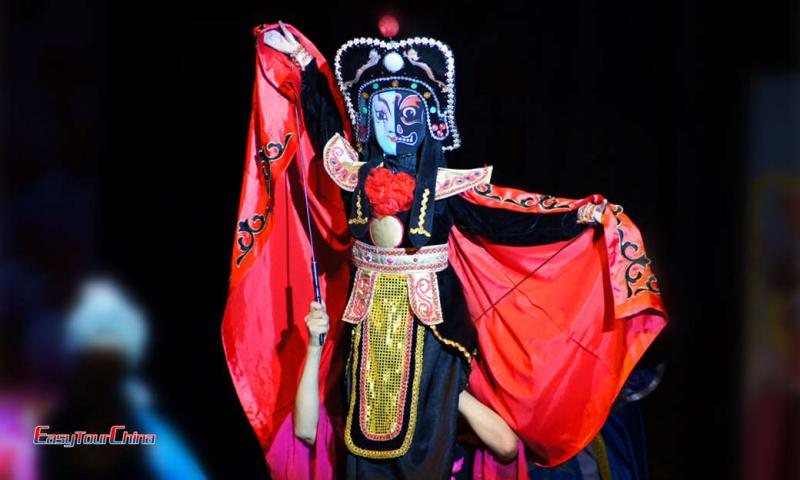
Makeup
Before performing, Sichuan opera actors have to paint various patterns with different colors on their faces to show their identity, appearance, and personality characteristics. Throughout history, there were no specific facial painters for actors in Sichuan opera, and actors used to draw their own facial makeup. Under the rules of maintaining the essential features of the roles in the play, actors can creatively draw facial makeup according to their own traits to achieve the effect of attracting the attention of the audience. The flexibility of Sichuan opera facial makeup is rare to see in all kinds of local operas.
According to the facial makeup, the audience can tell the basic character of the roles, based on the colors, patterns, and sometimes words on the facial make up. For example, the Sichuan opera uses colors to express the essential features of the roles. Red is often used to represent loyal, courageous and unselfish characters; white is mostly used to express cruel and insidious people; gold, silver, and gray have a sense of illusion and mystery, so they are mostly used to represent the roles of Buddha, gods, immortals, monsters, and ghosts.
Where to see the best Sichuan Opera in Chengdu?
English name: Shu Feng Ya Yun Sichuan Opera Theater
Chinese name: 蜀风雅韵
Address: Chengdu Culture Park, 23 Qintai Lu, Chengdu, Sichuan, China. 中国.四川.成都.青羊区琴台路文化公园内.
Opening time: 8:00pm.
Lasting time for the Sichuan Opera show: 90mins.
Ticket price: from RMB120.
How to get to the Shu Feng Ya Yun Sichuan Opera Theater?
By Metro Line: take line No.2 and get off at Huitongmen station (惠通门站) and out from exit E.
By public bus: take bus No. 5、13、43、47、58、64、78、1079, get off at Huitongmen stop (惠通门站) and walk for around 560m.
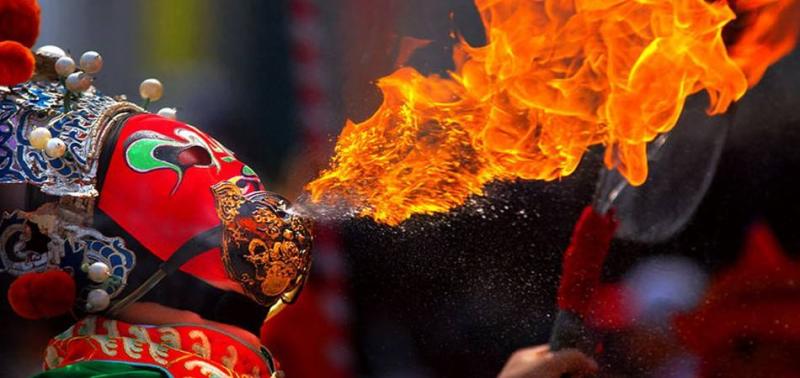
Travel Tips
1. Please book the ticket for the Sichuan Opera show as early as possible, from your tour guide or travel consultant, just in case the tickets are sold out.
2. Optional Sichuan opera character dressing up + photo taking service is available to choose at the Shufengyayun Sichuan Opera Theater. Early booking is required.
3. The ticket of the Shufengyayuan show includes a cup of tea.
4. Many tea houses in Chengdu offer a shorter Sichuan Opera show as well.
More Attractions in Chengdu
